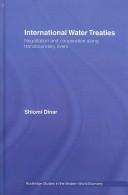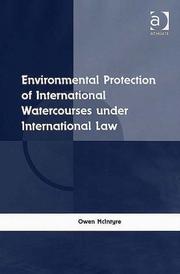| Listing 1 - 10 of 10 |
Sort by
|
Book
ISBN: 9781785369827 1785369822 Year: 2017 Publisher: Cheltenham: Elgar,
Abstract | Keywords | Export | Availability | Bookmark
 Loading...
Loading...Choose an application
- Reference Manager
- EndNote
- RefWorks (Direct export to RefWorks)
Water resources development --- Law and legislation --- Law and legislation. --- Water resources development - Law and legislation --- Australie --- Afrique du Sud --- Finlande --- Argentine --- États-Unis --- Kenya --- Canada --- Chine --- Indonésie
Book
ISBN: 0367584166 9780367584160 9781138603257 1138603252 Year: 2020 Publisher: Abington: Routledge,
Abstract | Keywords | Export | Availability | Bookmark
 Loading...
Loading...Choose an application
- Reference Manager
- EndNote
- RefWorks (Direct export to RefWorks)
In 2017 four rivers in Aotearoa New Zealand, India, and Colombia were given the status of legal persons, and there was a recent attempt to extend these rights to the Colorado River in the USA. Understanding the implications of creating legal rights for rivers is an urgent challenge for both water resource management and environmental law. Giving rivers legal rights means the law can see rivers as legal persons, thus creating new legal rights which can then be enforced. When rivers are legally people, does that encourage collaboration and partnership between humans and rivers, or establish rivers as another competitor for scarce resources?To assess what it means to give rivers legal rights and legal personality, this book examines the form and function of environmental water managers (EWMs). These organisations have legal personality, and have been active in water resource management for over two decades. EWMs operate by acquiring water rights from irrigators in rivers where there is insufficient water to maintain ecological health. EWMs can compete with farmers for access to water, but they can also strengthen collaboration between traditionally divergent users of the aquatic environment, such as environmentalists, recreational fishers, hunters, farmers, and hydropower. This book explores how EWMs use the opportunities created by giving nature legal rights, such as the ability to participate in markets, enter contracts, hold property, and enforce those rights in court. However, examination of the EWMs unearths a crucial and unexpected paradox: giving legal rights to nature may increase its legal power, but in doing so it can weaken community support for protecting the environment in the first place. The book develops a new conceptual framework to identify the multiple constructions of the environment in law, and how these constructions can interact to generate these unexpected outcomes. It explores EWMs in the USA and Australia as examples, and assesses the implications of creating legal rights for rivers for water governance. Lessons from the EWMs, as well as early lessons from the new ‘river persons,’ show how to use the law to improve river protection and how to begin to mitigate the problems of the paradox.
Rivers --- Water resources development --- Locus standi --- Law and legislation --- Standing in court --- Parties to actions --- Procedure (Law) --- Rivers - Law and legislation --- Water resources development - Law and legislation
Book
ISBN: 9780195374131 0195374134 Year: 2008 Publisher: Oxford: New York: Oxford university press,
Abstract | Keywords | Export | Availability | Bookmark
 Loading...
Loading...Choose an application
- Reference Manager
- EndNote
- RefWorks (Direct export to RefWorks)
Water resources development --- Water-supply --- International rivers --- Law and legislation --- Management --- Management. --- Water resources development - Law and legislation - European Union countries --- Water-supply - European Union countries - Management --- Water-supply - Law and legislation - European Union countries --- International rivers - European Union countries
Book
ISBN: 9781849714464 9780203135365 9781136484391 9781136484346 9781136484384 9781138573925 1849714460 Year: 2013 Publisher: Abingdon: Routledge,
Abstract | Keywords | Export | Availability | Bookmark
 Loading...
Loading...Choose an application
- Reference Manager
- EndNote
- RefWorks (Direct export to RefWorks)

ISBN: 9780415772082 0415772087 9780203934456 9781135981860 9781135981907 9781135981914 9781138806146 Year: 2007 Publisher: London : Routledge,
Abstract | Keywords | Export | Availability | Bookmark
 Loading...
Loading...Choose an application
- Reference Manager
- EndNote
- RefWorks (Direct export to RefWorks)
International rivers. --- Water-supply --- Treaties. --- Cours d'eau internationaux --- Eau --- Traités --- International cooperation. --- Approvisionnement --- Coopération internationale --- WATER RIGHTS (INTERNATIONAL LAW) --- WATER--LAW AND LEGISLATION --- WATER RESOURCES DEVELOPMENT--LAW AND LEGISLATION --- INTERNATIONAL RIVERS

ISBN: 1317142217 1317142209 1281099686 9786611099688 9780754684922 075468492X 9780754684923 9781281099686 9780754670551 0754670554 9781317142218 9781317142201 6611099689 9781315580043 9781317142195 9781138273825 1138273821 1315580047 Year: 2007 Publisher: Aldershot, England ; Burlington, VT : Ashgate,
Abstract | Keywords | Export | Availability | Bookmark
 Loading...
Loading...Choose an application
- Reference Manager
- EndNote
- RefWorks (Direct export to RefWorks)
McIntyre's work explains the legal means by which requirements of environmental protection influence the determination of a reasonable and equitable regime for allocating rights to riparian states to utilize shared freshwater resources.
International rivers. --- Water rights (International law) --- Water --- Water resources development --- Liability for water pollution damages. --- Water pollution damages, Liability for --- Liability (Law) --- Liability for environmental damages --- Torts --- Water quality --- Environmental law --- International law --- Rivers, Right of navigation of --- Rivers --- Pollution --- Law and legislation. --- Law and legislation --- International rivers --- Liability for water pollution damages --- Water - Pollution - Law and legislation --- Water resources development - Law and legislation
Book
ISBN: 9780199565085 0199565082 1299916473 0191653012 0198782756 0191653004 0191790400 Year: 2013 Publisher: Oxford: Oxford university press,
Abstract | Keywords | Export | Availability | Bookmark
 Loading...
Loading...Choose an application
- Reference Manager
- EndNote
- RefWorks (Direct export to RefWorks)
Fresh water is an environmental, economic, social, and cultural commodity. This book provides a thorough assessment of its protection, management, and uses in international law. It explores the international, regional, and national regulatory frameworks that make up the international legal regime regulating fresh water.
Water rights (International law) --- Fresh water --- Water resources development --- Water security --- Natural resources --- Droits sur les eaux (Droit international) --- Eau douce --- Ressources en eau --- Sécurité de l'eau --- Ressources naturelles --- Law and legislation --- International cooperation --- Droit --- Exploitation --- Coopération internationale --- Sécurité de l'eau --- Coopération internationale --- Fresh water - Law and legislation --- Water resources development - Law and legislation --- Water security - International cooperation --- Law and legislation. --- International cooperation.
Book
ISBN: 925003010X 9789250030104 Year: 1993 Volume: 50 50 50 Publisher: Rome: FAO,
Abstract | Keywords | Export | Availability | Bookmark
 Loading...
Loading...Choose an application
- Reference Manager
- EndNote
- RefWorks (Direct export to RefWorks)
Water rights --- Water resources development --- Water rights (International law) --- Law and legislation --- International cooperation. --- -Water rights (International law) --- -Water resources development --- -#ABIB:dd.Prof.R.Dudal --- #ABIB:FAOdeposit --- Energy development --- Natural resources --- Water-supply --- International law --- Rights, Water --- Water --- Riparian rights --- Water trusts --- International cooperation --- #ABIB:dd.Prof.R.Dudal --- Water rights - Europe. --- Water resources development - Law and legislation - Europe. --- Water resources development - International cooperation.
Book
ISBN: 9781107035973 1316500594 9781316500590 9781139565752 110727270X 1139892576 1107272041 1139565753 1107274133 1107275377 1107278627 1107277396 9781461936701 1461936705 9781107275379 9781107274136 110703597X 1299772889 Year: 2013 Publisher: Cambridge Cambridge University Press
Abstract | Keywords | Export | Availability | Bookmark
 Loading...
Loading...Choose an application
- Reference Manager
- EndNote
- RefWorks (Direct export to RefWorks)
Climate change, population growth and the increasing demand for water are all capable of leading to disputes over transboundary water systems. Dealing with these challenges will require the enhancing of adaptive capacity, the improving of the quality of water-resources management and a reduction in the risk of conflict between riparian states. Such changes can only be brought about through significant international cooperation. Christina Leb's analysis of the duty to cooperate and the related rights and obligations highlights the interlinkages between this duty and the principles of equitable and reasonable utilisation and the prevention of transboundary harm. In doing so, she considers the law applicable to both international watercourses and transboundary aquifers, and explores the complementarities and interaction between the rules of international water law and the related obligations of climate change and human rights law.
Water rights (International law) --- Water resources development --- Watershed management --- Riparian rights --- Water-supply --- Law and legislation --- International cooperation --- Management --- Riparian rights. --- LAW / Environmental. --- Law and legislation. --- International cooperation. --- Management. --- Water rights (International law). --- Water rights (international law). --- Law / environmental. --- Watershed development --- Watersheds --- Ecosystem management --- Rights, Riparian --- Land tenure --- Water rights --- International law --- Law --- General and Others --- Water resources development - Law and legislation --- Watershed management - Law and legislation --- Watershed management - International cooperation --- Water resources development - International cooperation --- Water-supply - Management
Book
ISBN: 9783319211305 3319211293 9783319211299 3319211307 Year: 2015 Publisher: Cham : Springer International Publishing : Imprint: Springer,
Abstract | Keywords | Export | Availability | Bookmark
 Loading...
Loading...Choose an application
- Reference Manager
- EndNote
- RefWorks (Direct export to RefWorks)
The book investigates the role interest groups have played over the years to influence the governments of Lesotho and South Africa, the World Bank and project implementation authorities in changing some policy aspects of the Lesotho Highlands Water Project (LHWP). Some of the issues being agitated by the interest groups are the resettlement of villagers where some of the dams for the projects are being constructed. The author argues that interest groups and individuals have the ability to influence the above-mentioned institutions and to such an extent that water politics and governance is not the domain of state institutions only.
Social Sciences. --- International Relations. --- Water Policy/Water Governance/Water Management. --- Environmental Economics. --- Political Theory. --- Sustainable Development. --- Social sciences. --- Sustainable development. --- Environmental economics. --- Sciences sociales --- Développement durable --- Economie de l'environnement --- Katse Dam (Lesotho). --- Pressure groups -- Lesotho. --- Water resources development -- Government policy -- Lesotho. --- Water resources development -- Law and legislation -- Lesotho. --- Law, Politics & Government --- International Relations --- Water resources development --- Pressure groups --- Government policy --- Law and legislation --- Katse Dam (Lesotho) --- Advocacy groups --- Interest groups --- Political interest groups --- Special interest groups (Pressure groups) --- Political science. --- Environmental management. --- Political theory. --- International relations. --- Political Science and International Relations. --- Functional representation --- Political science --- Representative government and representation --- Lobbying --- Policy networks --- Political action committees --- Social control --- Energy development --- Natural resources --- Water-supply --- Development, Sustainable --- Ecologically sustainable development --- Economic development, Sustainable --- Economic sustainability --- ESD (Ecologically sustainable development) --- Smart growth --- Sustainable development --- Sustainable economic development --- Economic development --- Administration --- Civil government --- Commonwealth, The --- Government --- Political theory --- Political thought --- Politics --- Science, Political --- Social sciences --- State, The --- Economics --- Environmental quality --- Coexistence --- Foreign affairs --- Foreign policy --- Foreign relations --- Global governance --- Interdependence of nations --- International affairs --- Peaceful coexistence --- World order --- National security --- Sovereignty --- World politics --- Environmental aspects --- Economic aspects --- Environmental stewardship --- Stewardship, Environmental --- Environmental sciences --- Management
| Listing 1 - 10 of 10 |
Sort by
|

 Search
Search Feedback
Feedback About UniCat
About UniCat  Help
Help News
News